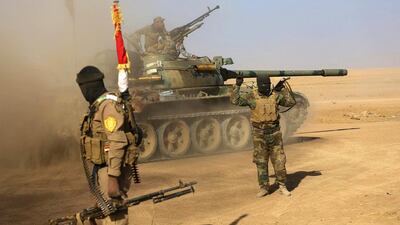On Saturday, Iraq’s parliament passed a law that formally integrated the volunteer paramilitary organisation known as Hashed Al Shaabi into the security forces. According to the law, the militia will be an “independent military entity” operating within the country’s armed forces.
The law comes at a time when Iraq is – at least in theory – reaching the finish line in its fight against ISIL. Three days before the law passed, Hashed Al Shaabi closed off the last exit for ISIL members inside Mosul when its fighters reached the town of Sinjar, to the west. Six weeks after the battle for Mosul started, the city is now closed off in all directions.
It also follows an extensive outreach drive by the force’s leaders inside and outside Iraq. This included recent visits by the force’s administrative director to two Arab countries to meet Sunni Iraqis he referred to as close to the Baathists.
In August, the news website Al Monitor reported that the force sent a delegation to Beirut to meet representatives of western countries and nongovernment organisations.
Before the law passed, chatter in Iraq suggested that the clerical authority in Najaf, which helped establish the force through a fatwa, might issue another edict asking the organisation to disband. Some had feared that another fatwa by Ayatollah Ali Al Sistani could disperse it. The passage of the law as ISIL is retreating in Iraq is at least in part an attempt to consolidate the gains made over the past two years. The “military entity” now has the mandate to respond to security threats anywhere in Iraq.
The move charts a new path for Iraq through the creation of a parallel military force with unbridled ambitions. In addition to widespread accusations of abuse, some of the factions that operate within this force already fight in Syria under Iranian supervision. Even associates of the Hashed Al Shaabi, including Al Fayyadh, have drawn parallels between the force and Iran’s revolutionary guard.
Overblown claims about the force’s representativeness of various components of Iraqi society add to the worrying implications of its incorporation into the state. For example, various media reports suggested the force includes between 30,000 and 40,000 Sunni fighters.
Yazan Al Jubouri, a Sunni leader of a militia fighting with Hashed Al Shaabi, was cited by Foreign Policy magazine as making such a claim. But the same official also told Sharqiyah TV that 30,000 of the 40,000 might be "ghost soldiers", because the figures had been inflated to gain financial support or exaggerate the group's political influence.
Consolidation of the organisation’s influence has to be examined through another political effort spearheaded by the Iraqi National Alliance, a coalition of Shia Islamist parties that ensured the passage of the Hashed Al Shaabi law on Saturday. The INA proposes what it calls a “historic initiative” to put an end to the country’s political disputes through a no-victor-no-vanquished formula.
As with the Hashed Al Shaabi law, the political initiative aims to bolster the existing order, but it is presented in a new tone that many Sunnis in Iraq seem to gravitate towards. Shia leaders, including Islamic Supreme Council leader Ammar Al Hakim, say that a new political contract is needed to break the stagnation. The relationship between Shias and Sunnis, he said, had “reached maturity”. More importantly, Mr Sistani is also reportedly throwing his weight behind the no-victor-no-vanquished formula to resolve political disputes.
The change in tone might be a result of a perceived opening. Officials still categorically reject the inclusion of those whom they refer to as Baathists and takfiris (those who excommunicate fellow Muslims) – although the individuals involved do not necessarily fallinto these categories. The large scale of Sunni displacement and the unimaginable destruction and shortage of services in Sunni areas make ordinary people feel in need of a government that provides aid. Because of this, some in Baghdad hope that this new situation is a rare opportunity to weaken the traditional Sunni opposition.
But this dynamic might be transient, limited to the current dire circumstances. Counting on the political fatigue of a large number of Sunnis might be counterproductive, especially as ISIL also seeks to capitalise on the destruction to recruit members. In separate statements to different television channels, Iraqi officials have recently indicated that ISIL is already reviving cells and recruiting in some areas, including Diyala, Samaraa and Tikrit.
As ISIL retreats in Iraq, it is possible to see signs of hope that the country will finally take a new path. The outreach efforts by Iraqi politicians, regardless of their intentions, offer a rare chance for a reset. At the same time, the country is adding new challenges to its list of crises. The implications of having a parallel entity integrated into its state structure might be the most unpredictable of all.
Hassan Hassan is a resident fellow at the Tahrir Institute for Middle East Policy and co-author of ISIS: Inside the Army of Terror
On Twitter: @hxhassan

